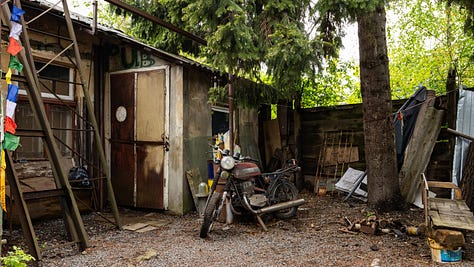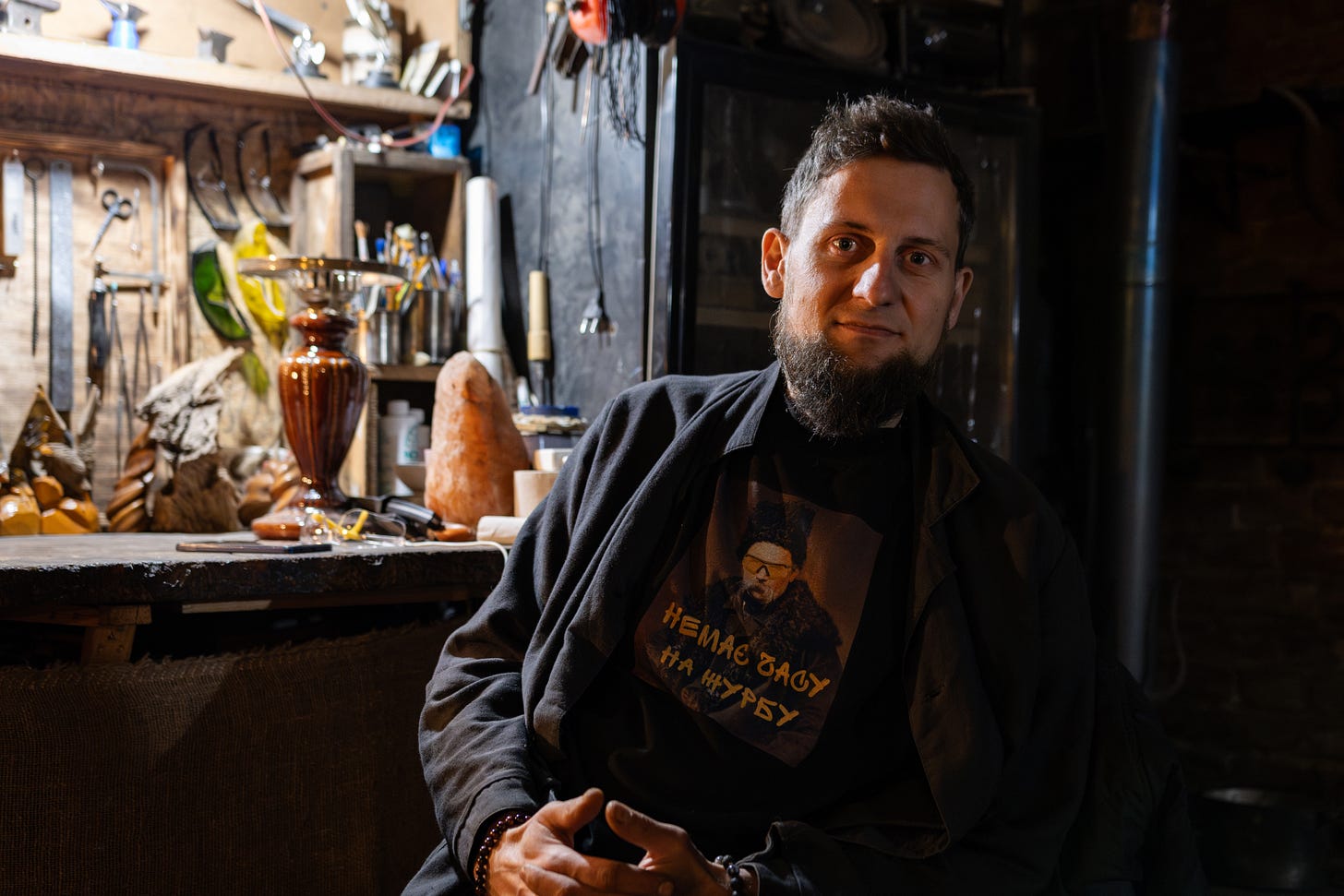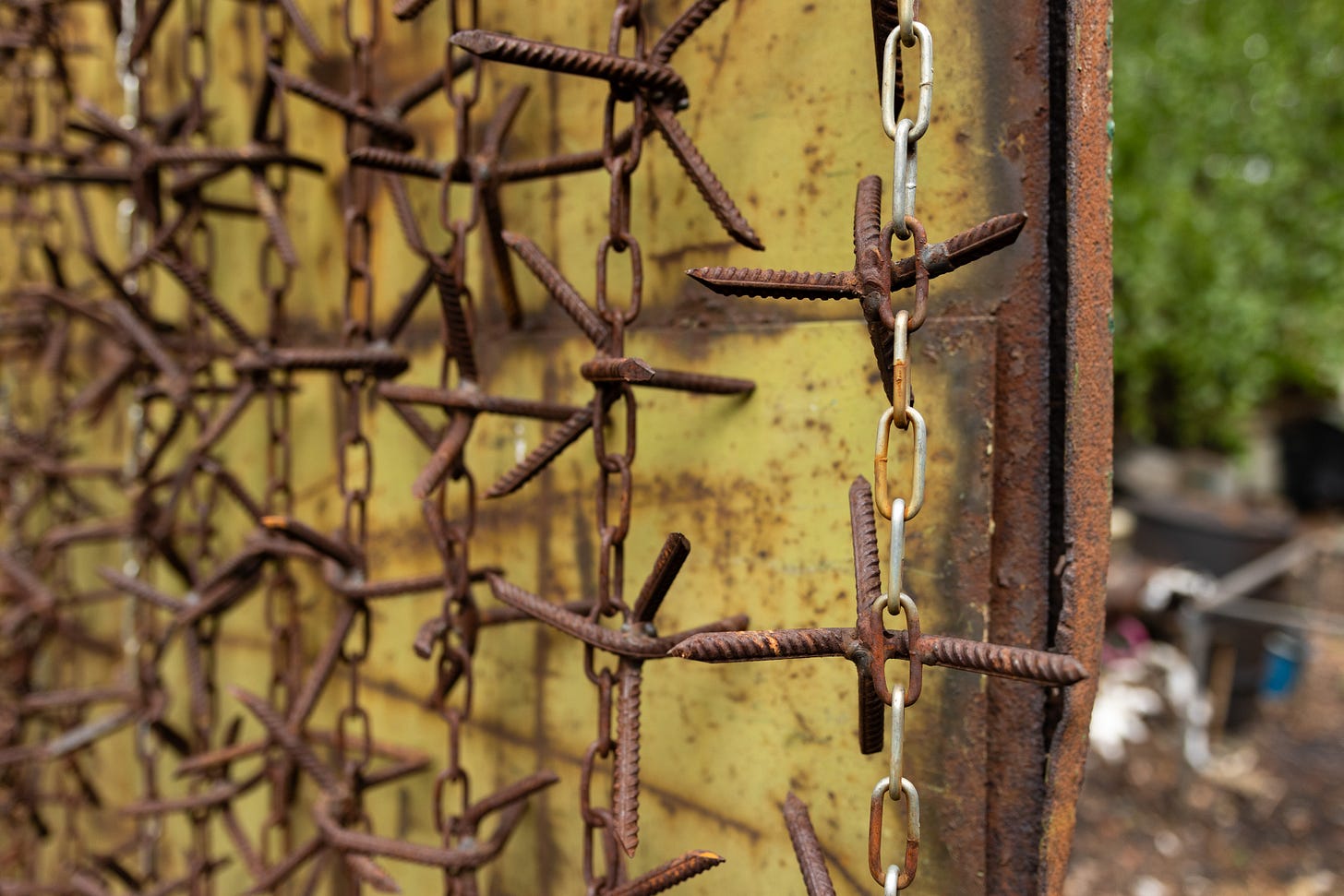The Political Nature of Ukrainian Art: My Interview With: Vitaly Valterovych
“I feel like we are a gladiator fighting a boar, and everyone is just watching, cheering, and wondering who will win.” This is how artist Vitaly Valterovych sees his country of Ukraine.
In a backyard of Lviv’s “Little Berlin” district, there is sat a small table of people sipping tea and speaking about Ukraine. It is myself, Vitaly, poet Ivanna Bura, and my friend and translator, Andriy Maslyuk. We are sitting in Vitaly’s workshop and the home of his project "WildDwarf," an artist residency program aimed at helping artists displaced from the war. Since the full scale invasion of Ukraine, over 10 million Ukrainians have become refugees of some sort.
With two thirds of that 10 million fleeing the country altogether, that leaves 3.7 million people displaced within their own country. Ukrainians who are displaced within Ukraine often struggle as the small government payments given to them is barely enough for food, let alone a stable place to live. This is not even to mention the fact that there are few jobs to go around even for the original residence of a city. I believe this is something most Westerners do not understand: the life of a refugee, even within one's own country, is a hard one and not an easy choice to make as some make it out to be. This is part of why I believe projects like WildDwarf are important — to help these artists, these Ukrainians, and to showcase their country, culture, and spirit through their work. It is important to remember that while Ukrainian art is in the spotlight like never before, Vitaly remarks that the cost of this was all-out war.



I was lucky enough to speak with Vitaly and tour the grounds of the residency before it was opened to the public. I must admit, the workshop is a bit of a spectacle in and of itself! Antlers hang from the wall, furniture is nailed to the ceiling, a shining case of jewelry is opposite a wall filled floor to ceiling with books, film cameras, knives, and what Vitaly calls “magic wands,” walking sticks embedded with a crystal and an RFID chip. His artistic style is to mix the wild and untamed elements with elegant gems or metals and then add “magic” into it. To turn whatever he is working on into something of an artifact — something you would imagine spending a lifetime looking for. This creative idea bleeds into the man himself. Vitaly is a character in the best possible sense of the word. The truest sense of the word “Artist”, very knowledgeable about geopolitics and a true patriot.
Vitaly would tell me about his brief time living in Russia long before the full-scale invasion. He talked with me about how he would go to local museums and see a massive amount of stolen Ukrainian artifacts on display. I imagine that number has increased exponentially as Russian forces have been stealing art and cultural artifacts at a rate not seen since Nazi Germany. Vitaly would tell me that in Russia he saw people trying to survive against each other, the police acting as a lawless gang, and having many connections with criminals they were supposed to stop. When I asked him about the character of the Russian nation, he said, Quote:
Vitaly: “Russia often works as a snake. They are backstabbing people, their tactics are very treacherous, and they never work in just one direction. They often work in several directions, and one of them is to take key leadership positions inside of the country they are targeting; for example, Georgia has the same problem. Also, we have this problem.”
“In Georgia recently, they voted for a pro-Russian proposal and people are protesting, but still, politicians did it — they sold their souls. Similar things are happening in Ukraine. Still, in Ukraine people we are calling them “Werewolves.”
Andriy explains: “There is a good word for werewolf in Ukrainian and a bad word. This is a bad word.”
I asked Vitaly to expand a bit about Ukraine. Quote:
Vitaly: "We have the situation where the whole Ukrainian people, the whole nation, are on the arena. There are three sides to look at it. Like, on the one hand, we are responsible ourselves for those people take power, so we are not protesting enough against them; on the second hand, we should deal with the situation that is right now, so deal with what we have. But on the third view, the people who know what’s happening they are afraid because of the situation we have.”
“I can’t understand why people had no choice, why people would wake up in the morning and they had nothing - there was no preparation. Here we are far away from the frontline, remember, we had time to prepare, and when this invasion started we were making Molotov cocktails, we were making other equipment (in the WildDwarf courtyard are forged spikes meant to stop vehicles of war), anti-tank and anti-vehicle hedgehogs to stop the Russians. We were prepared, but those brave people here organized themselves …but the other regions of Ukraine, people had no time.”
“...Basically, Russians just appeared and they found them naked. But Ukrainians, Ukrainians are strong, if they had time to prepare, they would have met Russians with fire - they would burn in hell.”
“So if, let’s imagine, only ten percent of Ukrainians decided to stay and fight and 90 percent would leave, it's very unrealistic because Ukrainians are very brave, but let’s imagine. If every person will throw one Molotov cocktail and if you imagine this whole column of Russians, they will burn in 60 seconds.”
“We also have a problem with our internal situation. The factory or facility can be the best in the world - they can have the best specialists, the best equipment, but if the top management wants to shut it down, nothing will save it. So we need better-quality leadership in this facility. And in fact, good management can save a bad factory.”
Speaking on US/Ukraine relations:
Vitaly: "Also, our allies guaranteed our security when Ukraine agreed to give away its nuclear weapons, its strategic bomber force. We were just offered protection and security guarantees but now our allies, the United States, they do not guarantee our security fully but I can understand the American government too. During the meeting with our president, the Americans asked for two things to be ameliorated: get rid of corruption and get rid of people influenced by Russia in your team (people under suspicion of having some ties with Russia.) but our president said he trusts those people. So I understand why they are hesitant but I am still disappointed. If it was up to me, I would not give money either, just weapons.”
(It is important to note that the majority of aid to Ukraine stays within the US for weapon production and the replacement of gear we give Ukraine to defend itself. My time with Vitaly was also during the great US holdup, the congressional blocking of any Ukrainian aid bill.)
Vitaly: “Very important thing is to have enough weapons, we don’t have enough weapons. Our soldiers, our worries they need it. We have enough soldiers but they don’t have enough weapons and most of the weapons they are old Soviet designs. We don’t have enough modern weapons and we don’t even have enough Soviet weapons! That’s what I meant by saying I’m a gladiator in the arena. This is the fight where all the odds are against you.”
Devin: “And somehow you need to find a way to win.”
Vitaly: “We are working on it (laughter).”
Did I find a way to turn an article about art and artist residency into a perspective on Russia’s war against Ukraine? Well, not quite. You see, war has a profound effect on artists, as their way of expression is a reflection of their own psyche. I notice this even within myself and my own work.
I very much look forward to returning to WildDwarf and sitting once again at a small table with a cup of tea in my hand, speaking for hours in a dusty workshop with friends.
”Art is an instrument in the war against the enemy.” - Pablo Picasso
Vitaly’s Instagram: www.instagram.com/wilddwarf






